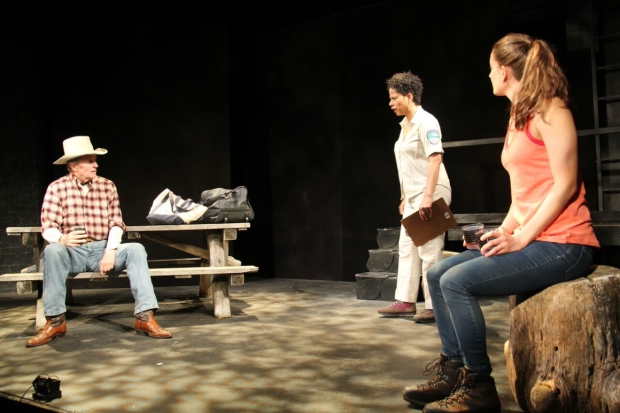
(© Margaret Purcell)
There are no "bells and banjos" for 28-year-old lawyer, feminist, and environmental advocate Melissa Golden (Jessica DiGiovanni). A handsome Steve McQueen is not waiting outside Macy's to sweep her off her feet and offer her and her unborn child wedded legitimacy. The latter is but a distant fantasy, if even a priority at all. Shirking the pre-Roe v. Wade romanticism of Love With the Proper Stranger, Melissa's Choice, a new play by Steven Somkin now running at the Lion Theatre, depicts a woman's right "to choose" in a manner much more suited to our 21st-century culture of stoic pragmatism — with plugs for a few social causes on the side.
Melissa and her boyfriend of one year — a biologist and PhD candidate named Tad (Ari Butler) — venture from Chicago to a campsite in the wilds of Oregon for a romantic getaway. Butler's soothing voice and earthy demeanor suits Tad's crunchy-granola character, who is tasked with introducing Melissa to the beauty of nature. But before long, he gets called back east for a funeral and a last-minute thesis defense, leaving Melissa to enjoy these foreign woods by her lonesome. She just has one small thing to share before he goes — she is pregnant with his child.
Like the sensitive scientist he is, abortion is the first thing to pop into Tad's head, and he is not shy about his feelings. Melissa, on the other hand, is torn, as many women would be. But her inner turmoil has more to do with the maternal instincts that surprise her by butting up against her political convictions about overpopulation. Emotions and science juxtaposing each other? It couldn't be! Still, Melissa is gobsmacked by the contradiction and takes the following four days of Tad-less nature and contemplation to gather her thoughts and make her final choice.
As the days unfold, her life-affirming revelations are no more profound than the one that kicks off her journey to self-discovery. Somkin paints her as a hard-nosed liberal, burned by life, who has spent her legal career advocating for other women to exercise their right to choose (with references to both feminist and environmental principles, shoehorned to add contemporary relevance). DiGiovanni is every bit the tightly wound woman of stern principle Somkin imagined her to be. But Somkin's voice as a playwright does not fit comfortably on his leading lady, whose character never quite taps into the vein of modern-day feminism it shoots for. As Melissa's longtime marriage to the rule of law meets her unexplored wave of emotions, the resulting collision does not provide the explosion we need to truly bond with our protagonist — partly due to the austere dialogue (which DiGiovanni does her best to deliver naturally) and partly due to the play's unconvincing plot trajectory.
While Tad is away, Melissa calls up an "old flame" and fellow lawyer named Duffle (short for Duncan Taffle). She beckons him to the Oregon campsite so she can revisit the option of his wealthy Republican lifestyle, performed in an appropriately starched-collar manner by the winsome and finely manicured Jed Orlemann. Marriage is immediately thrown on the table while abortion is indubitably removed. Is he the Steve McQueen that Melissa has been searching for, or is his conservative lifestyle too confining for a forward-thinking millennial like her? She eerily fantasizes about her futures with both potential beaus — oddly paranormal vignettes awkwardly directed by Mel Cobb — but these are more disorienting than illuminating.
Left to roam the campgrounds alone, Melissa builds an unlikely family of spirit guides to help her choose the proper road. A forest ranger by the name of Melba Abraham (a maternal Kim Sykes) shares her own experiences as a single mother, with a second-act cameo by her prized gay son, Billy (an effervescent Gilbert L. Bailey II). A flirtatious cowboy Clyde — played by Stephen Bradbury with much more platonic charm than the text implies with his lascivious depiction — becomes a sage presence for Melissa as well, spouting the fortune-cookie wisdom he has gathered over his years as a man of nature. Her patchwork family and the sounds of the wilderness eventually guide her to a semblance of peace, but the emotional journey it takes to get there, most likely, will not be recognizable to any of Melissa's contemporaries in the audience.








